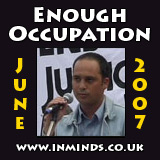
 Innovative Minds © 2014. All Rights Reserved. www.inminds.co.uk | ||||
Gagged in ChicagoJay Solomon The Chicago Council on Global Affairs has canceled a September speech on U.S.-Israel relations and Washington’s pro-Israel lobby by two prominent U.S. political scientists. John Mearsheimer and Stephen Walt were scheduled to use the Sept. 27 address to outline their upcoming book, “The Israel Lobby and U.S. Foreign Policy,” which is expected to be released by Farrar, Straus & Giroux early next month. But the president of the Chicago Council, Marshall Bouton, canceled the event under pressure from critics who were uncomfortable with the academics’ arguments, according to a letter drafted by Mearsheimer and Walt to the Council’s board. These opponents of the event argued that the two political scientists could only address the Chicago Council if someone from the opposing side, “such as Abraham Foxman of the Anti-Defamation League, concurrently appeared on stage with the authors. “One might argue that our views are too controversial to be presented on their own,” Mearsheimer and Walt wrote. “However, they are seen as controversial only because some of the groups and individuals that we criticized in our original article have misrepresented what we said.” Mearsheimer, a political scientist at the University of Chicago, and Walt, on the faculty at Harvard, set off a political firestorm last year when they penned an article for the London Review of Books, called the “Israel Lobby,” that argued pro-Israel interest groups had distorted U.S. policies in the Middle East. They also argued that these groups played a central role in promoting the Bush administration’s decision to invade Iraq. Since the original article appeared in March 2006, the two academics have appeared at a number of ventures to explain their views, such as the Council on Foreign Relations, the National Press Club and Georgetown University. But a number of leading Jewish-American organizations, such as the ADF and the American Jewish Congress, have consistently charged that Mearsheimer’s and Walt’s views are anti-Semitic and overemphasize the power of the pro-Israel lobby. Mearsheimer and Walt deny being anti-Semites and said the charges are designed “to discourage respected organizations like the Council from giving us an audience.” Original title of article: "Speechless in Chicago" Source: http://blogs.wsj.com/washwire/2007/08/07/speechless-in-chicago/ Backlash Over Book on Policy for IsraelPatricia Cohen “The Israel Lobby and U.S. Foreign Policy” is not even in bookstores, but already anxieties have surfaced about the backlash it is stirring, with several institutions backing away from holding events with the authors. John J. Mearsheimer, a political scientist at the University of Chicago, and Stephen M. Walt, a professor at the John F. Kennedy School of Government at Harvard University, were not totally surprised by the reaction to their work. An article last spring in the London Review of Books outlining their argument — that a powerful pro-Israel lobby has a pernicious influence on American policy — set off a firestorm as charges of anti-Semitism, shoddy scholarship and censorship ricocheted among prominent academics, writers, policymakers and advocates. In the book, published by Farrar, Straus & Giroux and embargoed until Sept. 4, they elaborate on and update their case. “Now that the cold war is over, Israel has become a strategic liability for the United States,” they write. “Yet no aspiring politician is going to say so in public or even raise the possibility” because the pro-Israel lobby is so powerful. They credit the lobby with shutting down talks with Syria and with moderates in Iran, preventing the United States from condemning Israel’s 2006 war in Lebanon and with not pushing the Israelis hard enough to come to an agreement with the Palestinians. They also discuss Christian Zionists and the issue of dual loyalty. Opponents are prepared. Also being released on Sept. 4 is “The Deadliest Lies: The Israel Lobby and the Myth of Jewish Control” (Palgrave Macmillan) by Abraham H. Foxman, the national director of the Anti-Defamation League. The notion that pro-Israel groups “have anything like a uniform agenda, and that U.S. policy on Israel and the Middle East is the result of their influence, is simply wrong,” George P. Shultz, a former secretary of state, says in the foreword. “This is a conspiracy theory pure and simple, and scholars at great universities should be ashamed to promulgate it.” The subject will certainly prompt furious debate, though not at the Center for the Humanities at the Graduate Center at the City University of New York, the Chicago Council on Global Affairs, a Jewish cultural center in Washington and three organizations in Chicago. They have all turned down or canceled events with the authors, mentioning unease with the controversy or the format. The authors were particularly disturbed by the Chicago council’s decision, since plans for that event were complete and both authors have frequently spoken there before. The two sent a four-page letter to 94 members of the council’s board detailing what happened. “On July 24, Council President Marshall Bouton phoned one of us (Mearsheimer) and informed him that he was canceling the event,” and that his decision “was based on the need ‘to protect the institution.’ He said that he had a serious ‘political problem,’ because there were individuals who would be angry if he gave us a venue to speak, and that this would have serious negative consequences for the council. ‘This one is so hot,’ Marshall maintained.” Mr. Mearsheimer later said of Mr. Bouton, “I had the sense that this phone call pained him deeply.” Mr. Bouton was out of town, but Rachel Bronson, vice president for programs and studies at the council, said, “Whenever we have topics that are particularly controversial or sensitive, we try to make sure someone from another point of view is there.” In this case, she said, there was not sufficient time to set up that sort of panel before the council calendar went out. There are no plans to have the authors speak at a later date, however. “One of the points we make in the book is that this is a subject that’s very hard to talk about,” Mr. Walt said in an interview from his office in Cambridge. “Organizations, no matter how strong their commitment to free speech, don’t want to schedule something that’s likely to cause controversy.” After the cancellation Roberta Rubin, owner of the Book Stall, a store in Winnetka, Ill., offered to help find a site for the authors. She said she tried a Jewish community center and two large downtown clubs but they all told her “they can’t afford to bring in somebody ‘too controversial.’ ” She added that even she was concerned about inviting authors who might offend customers. Some of the planned sites, like the Sixth & I Historic Synagogue, a cultural center in Washington, would have been host of an event if Mr. Mearsheimer and Mr. Walt appeared with opponents, said Esther Foer, the executive director. Mr. Walt said, “Part of the game is to portray us as so extreme that we have to be balanced by someone from the ‘other side.’ ” Besides, he added, when you’re promoting a book, you want to present your ideas without appearing with someone who is trying to discredit you. As for City University, Aoibheann Sweeney, director of the Center for the Humanities, said, “I looked at the introduction, and I didn’t feel that the book was saying things differently enough” from the original article. Ms. Sweeney, who said she had consulted with others at City University, acknowledged that they had begun planning for an event in September moderated by J. J. Goldberg, the editor of The Forward, a leading American Jewish weekly, but once he chose not to participate, she decided to pass. Mr. Goldberg, who was traveling in Israel, said in a telephone interview that “there should be more of an open debate.” But appearing alone with the authors would have given the impression that The Forward was presenting the event and thereby endorsing the book, he said, and he did not want to do that. A discussion with other speakers of differing views would have been different, he added. “I don’t think the book is very good,” said Mr. Goldberg, who said he read a copy of the manuscript about six weeks ago. “They haven’t really done original research. They haven’t talked to the people who are being lobbied or those doing the lobbying.” Overall Mr. Mearsheimer said he thinks the response to their views will be “less ferocious than last time, because it’s becoming increasingly difficult to make the argument in a convincing way that anyone who criticizes the lobby or Israel is an anti-Semite or a self-hating Jew.” Both Mr. Mearsheimer and Mr. Walt pointed to the growing dissatisfaction with the war in Iraq, criticism of Israel’s war in Lebanon and the publication of former President Jimmy Carter’s book “Palestine: Peace Not Apartheid” as making it somewhat easier to criticize Israel openly. “This isn’t a cabal; this isn’t anything secretive,” Mr. Walt said. American Jews who lobby on Israel’s behalf are not all that different from the National Rifle Association, the anti-tax movement, AARP or the American Petroleum Institute, he said, “They just happen to be really good at it.” “It’s the way American politics work,” he continued. “Sometimes powerful interest groups get what they want, and it’s not good for the country as a whole. I would say that about the farm lobby and about the Cuba lobby.” To the authors, dual loyalty is as American as Presidents’ Day sales and “Law & Order” reruns. As Mr. Mearsheimer explained: “People are allowed to have multiple loyalties. They have religious loyalties, loyalty to family, to an organization and you can have loyalty to other countries. Someone who is Irish can have a loyalty to Ireland.” “The problem,” he said “is when you raise the subject of dual loyalty, many people tend to think of it in the context of the old anti-Semitic canard and making the argument that Jews are disloyal to the U.S.” In print and in interviews both authors have stressed that they hold no animus towards Israel or Jews. “We think Israeli policy is fundamentally flawed,” Mr. Mearsheimer said, “just as we think American policy is fundamentally flawed.” Source: http://www.nytimes.com/2007/08/16/books/16book.html?hp
Related Items
Also Of InterestPage URL: http://www.inminds.co.uk/article.php?id=10198
|
|
Support Us
If you agree with our work then please support us.Campaigns INMINDS Facebook Live Feed Latest Video's
INMINDS Twitter Feed Tweets by @InmindsComFeatured Video's
You need Flash player 8+ and JavaScript enabled to view this video.
[all videos (over 200)..] Featured MP3 Podcast  "How could it be possible to keep on living a life where one side is an occupier and the other side occupied? No independence is possible as long as it sustains itself through the occupation, oppression, and humiliation of others." Israeli refusnik, Combatants for Peace Enough Occupation Rally, June 2007 [9min / 5Mb] [all podcasts..] Newsletter Feedback |
 |
 |















































